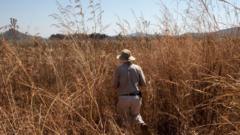Zimbabwe's government has announced the disbursement of an initial US $3 million in compensation to white farmers who lost their land more than two decades ago due to a contentious land reform program. This payment marks the first installment under a 2020 agreement pledging a total of US $3.5 billion to the former landowners. The land seizures, aimed at addressing colonial injustices, led to significant economic decline and strained international relations during the early 2000s.
Zimbabwe Begins Compensation Payments to Former White Farmers to Heal Historical Wounds

Zimbabwe Begins Compensation Payments to Former White Farmers to Heal Historical Wounds
Zimbabwe's government takes a step toward reconciliation with white farmers by initiating compensation payments for land seized during a controversial reform.
The recent payout will cover the damages for 378 farms out of an estimated total of 740 properties recognized for compensation. Finance Minister Mthuli Ncube outlined that the inaugural payment counts as just 1% of the initially earmarked US $311 million to settle claims of former farmers.
Despite this progress, representation of former farmers remains low, with many still holding onto their issued title deeds. Additionally, the Zimbabwean government stated it would only compensate for improvements made to the land, dismissing any claims concerning the value of the land that had been taken.
The land redistribution reform, initially executed in 2000 under then-President Robert Mugabe, had involved aggressive dispossession of farms, leading to widespread condemnation and significant repercussions on the economy. President Emmerson Mnangagwa, who succeeded Mugabe in 2017, is now endeavoring to rebuild ties with Western countries while affirming that the reversibility of land reform is not an option.
This compensation plan represents a critical juncture for Zimbabwe, showing a commitment to rectify historical wrongs while striving to stabilize its economy and attain international legitimacy after years of isolation.
Despite this progress, representation of former farmers remains low, with many still holding onto their issued title deeds. Additionally, the Zimbabwean government stated it would only compensate for improvements made to the land, dismissing any claims concerning the value of the land that had been taken.
The land redistribution reform, initially executed in 2000 under then-President Robert Mugabe, had involved aggressive dispossession of farms, leading to widespread condemnation and significant repercussions on the economy. President Emmerson Mnangagwa, who succeeded Mugabe in 2017, is now endeavoring to rebuild ties with Western countries while affirming that the reversibility of land reform is not an option.
This compensation plan represents a critical juncture for Zimbabwe, showing a commitment to rectify historical wrongs while striving to stabilize its economy and attain international legitimacy after years of isolation.




















